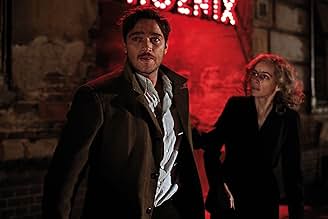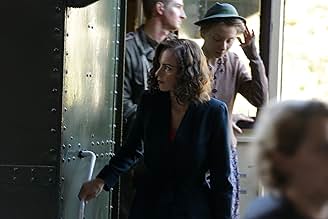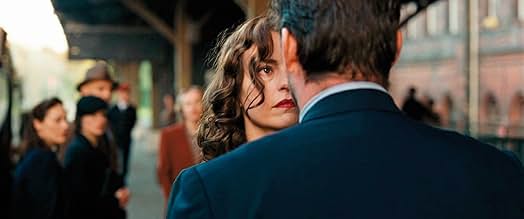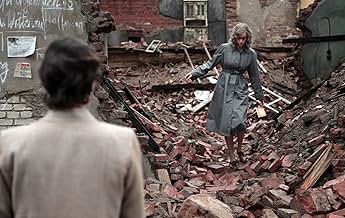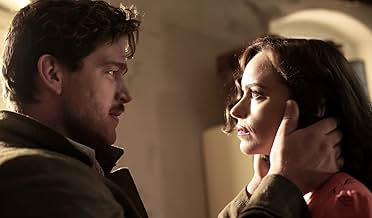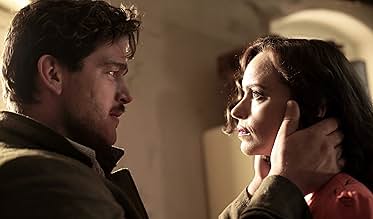Una sobreviviente desfigurada del Holocausto está determinada a averiguar si el hombre que amaba traicionó su confianza.Una sobreviviente desfigurada del Holocausto está determinada a averiguar si el hombre que amaba traicionó su confianza.Una sobreviviente desfigurada del Holocausto está determinada a averiguar si el hombre que amaba traicionó su confianza.
- Dirección
- Guionistas
- Elenco
- Premios
- 17 premios ganados y 30 nominaciones en total
- Tänzerin
- (as Valerie Koch)
- Dirección
- Guionistas
- Todo el elenco y el equipo
- Producción, taquilla y más en IMDbPro
Opiniones destacadas
Nina Hoss, Ronald Zehrfeld, and Nina Kunzendorf star in "Phoenix," a 2014 film based on the French novel "Return from the Ashes".
There was a previous film made from this novel, actually called Return from the Ashes in 1965. I remembered seeing that movie as a kid and finally found it again. It's very good, but this film is better.
Nina Hoss plays Nelly, a concentration camp survivor who was shot in the face. A government worker, Lena (Kunzendorf) in charge of helping victims, brings her to a plastic surgeon.
Nelly is adamant that she wants to look exactly as she did before. The doctor can only promise to try. When she asks Lena who is paying for all this, Lena tells her that her entire family is dead and she has come into quite a bit of money.
When Nelly sees herself, the face is foreign to her and she says, "I don't exist." She stays in an apartment with Lena. Lena has found an apartment for her in Palestine, where Lena is also moving.
Nelly wants to find her husband Johnny (Zehrfeld), a non-Jew, but Lena cautions her that he betrayed her to the Nazis. She was a singer and he a pianist, so she goes to various clubs, but finally finds him working in a club called Phoenix as a dishwasher.
Johnny doesn't recognize her, but he asks her if she wants some work. He explains to her that he can't get his hands on his wife's money. He wants her to impersonate Nelly, show up alive, claim her inheritance, and in return, he will pay her.
At first, Nelly refuses, then relents. He shows her a photo of Hedy Lamar and says his wife modeled herself on that.
Nelly returns to Lena and tells her that she's going to do the impersonation and not go to Palestine. She will stay with Johnny. She knows he would never have betrayed her.
Director Christian Pezold has woven noirish tapestry about survival, love, betrayal, and guilt. It is reminiscent of Vertigo but with the specter of the Holocaust, much deeper and intense.
Nina Hoss is beyond perfection as Nelly, desperate for her old life, her old face, her husband, to wipe out all she has suffered. Like Zehrfeld, she says more with her expressions than with dialogue. Zehrfeld as Johnny presents a disturbing puzzle of denial and horrific guilt, so unbearable that he tries to recreate Nelly.
The last scene in this film, in its simplicity, is stunning and powerful.
A brilliant film, which you may want to view more than once to pick up details along the way.
If this brings to mind the idea of Nicolas Cage and John Travolta swapping faces in the awesomely bad "Face/Off", then you're not far off the mark. But listen up, here's why it works perfectly.
The theme of "Phoenix" involves how people face an unacceptable past. There are 3 main characters who each personify a particular, extreme response. It has to be extreme, it has to be preposterous, and most importantly we have to accept it. Either that or just walk out of the theater after 5 minutes and watch Monday night football instead. Our 3 characers are: 1) Nelly - she cannot let go of her traumatic past, and at the same time she has no past because she has no identity, figuratively and literally. 2) The husband "Johnny" - he utterly rejects the past, for reasons you'll figure out soon enough, and so he refuses to recognize his wife. In fact, we get the feeling that even if she were the spitting image of herself, he would still refuse truth. Such is the nature of psychological denial. And 3) We have Nelly's only friend "Lena" who has become a tireless political activist, saving survivors and trying to keep the past "alive" even though she is confronted with a society that has already moved on.
So you see how this story isn't supposed to be taken as a literal drama but rather as a very creative metaphor to illustrate how psychology works in 3 vastly different personality types. Further driving the surreal nature home, we have gorgeously shot, vividly composed visuals. If you ever wondered how Film Noir would look in color, then look no further. There have been a few contemporary classics which sought to bring Film Noir into the modern age, such as 2005's "Sin City" with its introduction of red to the crisp b&w palette, or before that was 1994's "The Crow" with its use of extreme darkness and "dead" colors. Here in 2014's is the next decade's evolution. In this case there is bold use of colors, but they are distinctly and "impossibly" presented: a dark alley is illuminated with a ghostly red light even though there are no red light sources to be seen, or a dark scene of bombed out ruins has unrealistic islands of light illuminating patches of rubble, all in vivid color but with stark contrast against the black spaces. The cinematography and lighting is as purposely unrealistic as the plot.
Ultimately if you grasp all of this, or if you just decide to go along with it for the sake of seeing how everything turns out, your suspension of disbelief will be amply rewarded. As nearly every other reviewer has noted, the ending is fantastic. Beyond fantastic, it's the whole point of the movie. In an interview, director Christian Petzold says the entire story comes down to the last 3 minutes, and that's where it will either come together or utterly fall apart. For my money, it's a total winner. "Phoenix" definitely does NOT crash & burn.
Absolutely not to be missed, even (or particularly) if you think you've seen every possible treatment of the toll of the Holocaust on individual lives.
Even if you're a disfigured Holocaust survivor like Nelly (Nina Hoss), tomorrow's march of time will bring its own survival scenario. Her new face gives her problems with her husband, Johnny (Ronald Zehrfeld), as he recruits her to impersonate his wife in order to get his wife's inheritance. As in Hitchcock's Vertigo, the lead female undergoes transformation dealing with the man in her life while sustaining the mistaken identity motif.
Even that plot feels Hitchcockean. No question it's a classic suspend-your-disbelief situation, and it has the almost dreamy quality of Boy in the Striped Pajama. Both works take an isolated, unbelievable scenario related to the Holocaust that nevertheless illuminates the numbing, existential anguish of that horror.
While Nelly searches for Johnny, she is also discovering strength in herself that is part survival and part recognition that the corruption of Auschwitz is not the only corruption in the world. The depiction of that dark postwar world has German expressionism written all over it with the black and white contrasts, lonely European streets and even the corruption and irony of the cabaret.
Nina Hoss's performance, part stunned and part determined, deserves award-season recognition. Her uncertain gait and disfigured face suggest the disorientation the war has brought.
Director Christian Petzold deserves credit for the stunning noirish look that also reflects a real-world, anytime struggle humans have with the combat between appearance and reality and the realization that we cannot know each other completely. As the title suggests and the name of the night club reflects, regeneration is possible but may be as elusive as the mythical bird.
"No movie has ever been able to provide a catharsis for the Holocaust, and I suspect none will ever be able to provide one for 9/11. Such subjects overwhelm art." Roger Ebert
Hess is brilliant in the central role, a really difficult part that she makes absolutely convincing. The other star here is the cinematography. There are other fine moments too - a really creepy scene early on full of women with bandaged faces - that help set the atmosphere. But the real thrill is to see a story told with such conviction and concluded with such panache.
¿Sabías que…?
- TriviaThe woman on the magazine cover that Nelly liked to emulate was Hedy Lamarr.
- ErroresThe actor playing the US Army Sergeant sentry at the checkpoint is clearly German: while he speaks English well, his German accent still comes through.
- Citas
[first lines]
Lene Winter: [arriving at the border]
Soldat an der Brücke: Passport... Nice car. Where did you get it from?
Lene Winter: It's from Switzerland.
Soldat an der Brücke: Just like you?
Lene Winter: Like me.
Soldat an der Brücke: [whistles to the gate] They're from Switzerland. The girl too.
[to her passenger]
Soldat an der Brücke: I want to see your face.
Lene Winter: Can I talk to you?
[gets out]
Lene Winter: Come on, she's not Eva Braun.
Soldat an der Brücke: Of course not. The bitch got killed by her husband.
Lene Winter: She's from the camps.
- Bandas sonorasSpeak Low
Music by Kurt Weill
Lyrics by Ogden Nash
Performed by Nina Hoss and heard as a theme over the credits
Selecciones populares
- How long is Phoenix?Con tecnología de Alexa
Detalles
- Fecha de lanzamiento
- Países de origen
- Sitios oficiales
- Idiomas
- También se conoce como
- Фенікс
- Locaciones de filmación
- Legnica, Dolnoslaskie, Polonia(Berlin in 1945)
- Productoras
- Ver más créditos de la compañía en IMDbPro
Taquilla
- Total en EE. UU. y Canadá
- USD 3,184,472
- Fin de semana de estreno en EE. UU. y Canadá
- USD 30,296
- 26 jul 2015
- Total a nivel mundial
- USD 5,855,623
- Tiempo de ejecución
- 1h 38min(98 min)
- Color
- Mezcla de sonido
- Relación de aspecto
- 2.39 : 1


